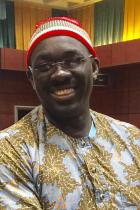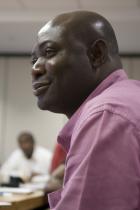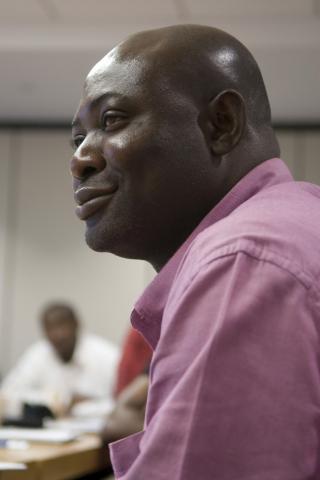Colins Imoh

Nigeria, 2011
Assistant Professor, Peace Studies and International Development EDI Facilitator, School of Social Sciences; Director, BA in International Relations, Politics and Security Studies, University of Bradford, Department of Peace Studies and International Development (PSID)
Colins Imoh has worked in various youth-based organizations and was involved in the setting up of the Africa Network of Young Peace Builders (ANYP). He was the Africa Desk Coordinator working at the International Secretariat of the UNOY in the Netherlands. The ANYP is a continental initiative that joins the efforts of young people in over 40 African countries for the purposes of building peace and actively collaborating in the search for the non-violent resolution of conflicts.
Imoh obtained his doctoral degree from the University of Toledo, USA, exploring the application of the capability approach developed by Amartya Sen in conflict prevention. An MA in Conflict Transformation and Organizational Leadership from Eastern Mennonite University, Harrisonburg, USA and an MPhil in Environmental Management and Sustainability from the University of Cape Town, Cape Town, South Africa. He holds a graduate certificate in Advanced Study of Nonviolent Conflict from the Fletcher School, Tufts University, Boston, USA. He was the pioneer coordinator of the Africa Network of Young Peace Builders, a strong network of about 200 youth-based organizations and individuals involved in Peacebuilding, human rights and good governance working from the UNOY Peacebuilders Foundation International Secretariat in the Netherlands. He served as the Partners for Peace (P4P) Project Manager, a network whose mission is to build social capital around peacebuilding. P4P is an initiative of Chevron Inc, USA. Before working as P4P Manager, he was the Director of the Centre for Social Transformation and Human Development (CHDST). He coordinated various peace & civic education programs in the communities, including the weekly live Radio program on democracy, good governance, human rights, peace, and development. He is an Advisory Board Member of the International Institute for Peace Education (IIPE); a Board of Experts of the One Humanity Institute; an International Steering Committee Member and Secretary of the African Peace Fellows Board of California State University, Sacramento, and a Member of the International Consultancy Panel of the Mediators Beyond Borders; among others. He is on the editorial board of In Factis Pax Journal of Peace Education and Social Justice. He has written articles and book chapters in his areas of interest.
Imoh long-term goal is to establish a center in the Niger Delta, which will be involved in training, research, and advocacy in the areas of environmental and conflict management.








